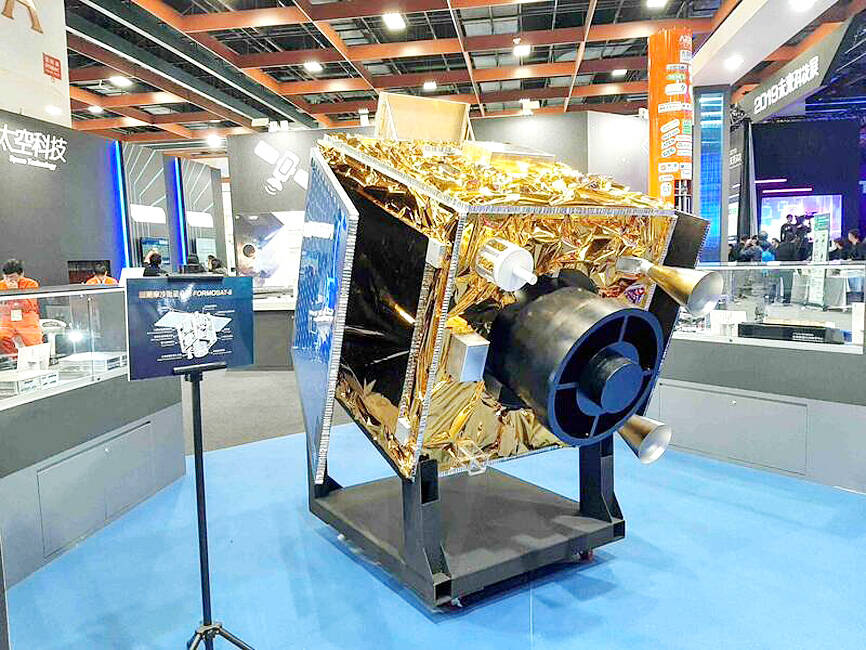The Taiwan Space Agency (TASA) on Thursday said that the Formosat-8 satellite could be launched at the end of next year.
TASA deputy director-general Yu Shiann-jeng (余憲政) said at a legislative hearing on Thursday that there is a chance Formosat-8 would be launched at the end of next year, and that the integration of the satellite is still being tested.
The National Science and Technology Council (NSTC) said TASA has raised the domestic content of the satellite to more than 80 percent, with the precise rate to be calculated once all tests have been completed.

Photo: screen grab from Taipei Aeropspace & Defense Technology Exhibition’s Web site
The Formosat-8 program is one of the priority missions of the third phase of the long-term national space technology program, which was scheduled to take place from 2019 to 2028 after it was approved by the Executive Yuan in 2018.
The council has proposed that the program be extended to 2031, and an official proposal would soon be sent to the Executive Yuan after cross-ministerial discussions, NSTC foresight and innovation policies department head Chen Kuo-liang (陳國樑) told the legislature.
Democratic Progressive Party Legislator Lin Yi-chin (林宜瑾) said TASA was invited by the US’ Space Foundation to participate in the latter’s Space Symposium for the first time last year, and has also been invited to attend this year, with TASA Director-General Wu Jong-shinn (吳宗信) heading a delegation to the event.
China on the other hand has not been invited for two consecutive years, showing that the US is alarmed by China’s space development, Lin said, adding that Taiwan should pay similar attention.
NSTC Deputy Minister Lin Minn-tsong (林敏聰) said that space science and industry are both strategically important and relate to geopolitics, adding that China’s absence from the Space Symposium is also related to geopolitical concerns.
Space technologies are part of Taiwan’s “national core technologies” and strictly controlled, he said, adding that the council and TASA would continue engaging in exchanges and establish connections with other countries.

Taiwan has received more than US$70 million in royalties as of the end of last year from developing the F-16V jet as countries worldwide purchase or upgrade to this popular model, government and military officials said on Saturday. Taiwan funded the development of the F-16V jet and ended up the sole investor as other countries withdrew from the program. Now the F-16V is increasingly popular and countries must pay Taiwan a percentage in royalties when they purchase new F-16V aircraft or upgrade older F-16 models. The next five years are expected to be the peak for these royalties, with Taiwan potentially earning

STAY IN YOUR LANE: As the US and Israel attack Iran, the ministry has warned China not to overstep by including Taiwanese citizens in its evacuation orders The Ministry of Foreign Affairs (MOFA) yesterday rebuked a statement by China’s embassy in Israel that it would evacuate Taiwanese holders of Chinese travel documents from Israel amid the latter’s escalating conflict with Iran. Tensions have risen across the Middle East in the wake of US and Israeli airstrikes on Iran beginning Saturday. China subsequently issued an evacuation notice for its citizens. In a news release, the Chinese embassy in Israel said holders of “Taiwan compatriot permits (台胞證)” issued to Taiwanese nationals by Chinese authorities for travel to China — could register for evacuation to Egypt. In Taipei, the ministry yesterday said Taiwan

Taiwan is awaiting official notification from the US regarding the status of the Agreement on Reciprocal Trade (ART) after the US Supreme Court ruled US President Donald Trump's global tariffs unconstitutional. Speaking to reporters before a legislative hearing today, Premier Cho Jung-tai (卓榮泰) said that Taiwan's negotiation team remains focused on ensuring that the bilateral trade deal remains intact despite the legal challenge to Trump's tariff policy. "The US has pledged to notify its trade partners once the subsequent administrative and legal processes are finalized, and that certainly includes Taiwan," Cho said when asked about opposition parties’ doubts that the ART was

If China chose to invade Taiwan tomorrow, it would only have to sever three undersea fiber-optic cable clusters to cause a data blackout, Jason Hsu (許毓仁), a senior fellow at the Hudson Institute and former Chinese Nationalist Party (KMT) legislator, told a US security panel yesterday. In a Taiwan contingency, cable disruption would be one of the earliest preinvasion actions and the signal that escalation had begun, he said, adding that Taiwan’s current cable repair capabilities are insufficient. The US-China Economic and Security Review Commission (USCC) yesterday held a hearing on US-China Competition Under the Sea, with Hsu speaking on